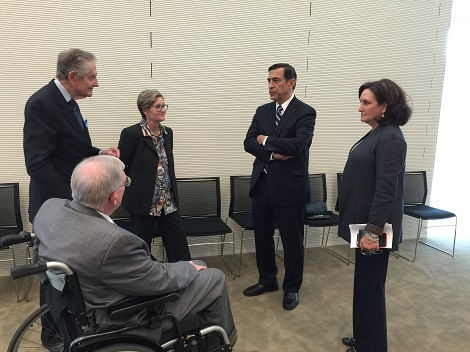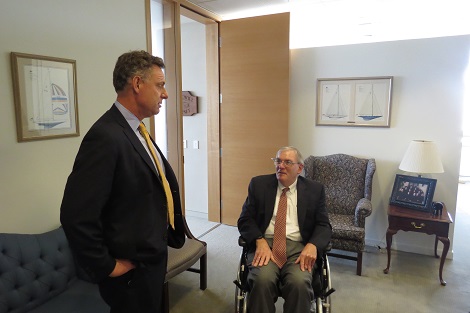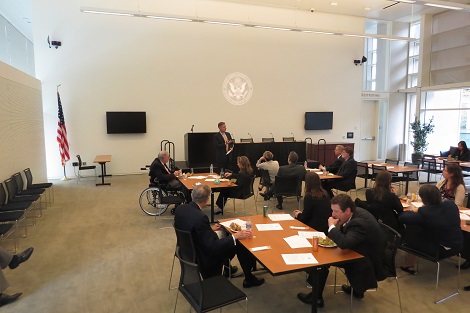Government Relations Event: Opening the Lines of Communication Between the Judiciary, Practitioners, and Our Congressional Representatives
By Leslie B. Overman, Ph.D., Esq., President of the San Diego Intellectual Property Law Association; Rebecca S. Kanter, a prosecutor and the Government Relations Liaison for the FBA San Diego Chapter; and Ryan W. Stitt, Trial Attorney for Federal Defenders of San Diego Inc. and Vice President of Fundraising for the FBA San Diego Chapter
Federal judges gathered with representatives of the federal bar in San Diego for the first two installments in what is planned to be a series of government relations events hosted by the FBA’s San Diego Chapter. At these events the local federal judiciary will have the opportunity to engage regional Congressional representatives on issues impacting the judiciary, including judicial vacancies, judicial funding, and criminal justice reform. Congressmen Darrell Issa and Scott Peters met with the judiciary and the leadership of the FBA at the James M. Carter and Judith N. Keep Courthouse on December 4, 2015 and January 22, 2016, respectively. Both Congressmen are members of the House Judiciary Committee, and Congressman Issa serves as the chairman of the Subcommittee on Courts, Intellectual Property, and the Internet.
Congressman Issa, who represents the 49th Congressional District, including Camp Pendleton and the northern portions of San Diego County, has a long history with the Southern District of California’s Chief Judge, Barry Ted Moskowitz. As Chief Judge Moskowitz recounted in his charming introduction, he first encountered Congressman Issa when Issa was a patent litigant in Judge Moskowitz’s courtroom. Chief Judge Moskowitz fondly recalled Issa’ s contribution to judicial economy, specifically, his ability to forge a quick and mutually agreeable solution that would settle a case in a matter of minutes.
Noting that the luncheon was the inaugural event of its kind and that it would set the bar for future meetings, Congressman Issa made only brief introductory remarks in order to allow as many questions as possible and engage most directly with the nearly 25 judges and attorneys present, including Ninth Circuit Judge Clifford Wallace. He noted there were 66 federal court vacancies, but observed that President Barack Obama has provided only 27 candidates and explained that it would be impossible for Congress to confirm nominees to fill all those seats before President Obama’s term ends, even if President Obama made the nominations this month. He also pointed out that although the greatest vacancy rate is in the Eastern District of Texas, the high demand for judges in that district stems from the fact that 25% of patent infringement cases are filed there.
A holder of over 30 patents, Chairman Issa was not shy about sharing his strong opinions regarding patent litigation. Congressman Issa shared his belief that if the cases in the Eastern District of Texas were more efficiently transferred – or disposed by inter partes review – the demand would be lessened, as well as the need to fill judicial vacancies. Issa obtained many of his patents before running for Congress, having previously served as the CEO of Directed Electronics, a company Issa founded and built in the mid-1990s to manufacture vehicle anti-theft devices.
Congressman Issa supported revising the criminal code, but acknowledged the chorus of opposition from prosecutors who insist that the risk of substantial punishment is critical to securing cooperation and achieving judicious dispositions.
Issa also addressed concerns about the creation of an Office of the Inspector General for the judiciary, noting that an executive branch OIG could threaten judicial independence and separation of powers. He challenged judges to better police themselves and their own branch of government in order to avoid the necessity of an OIG to investigate improper or illegal conduct by judges.
In response to a question of whether there would be reduced funding to legal services for the poor should the White House turn Republican, Congressman Issa pointed out that there was no such reduction in 2001 when Republicans gained control of both houses and the oval office. He challenged the characterization of Republicans as being mean-spirited and uncaring for the plight of the poor, and stated his party’s actual concern was ensuring that federal money is used as intended. Issa recalled a time when he was criticized for opposing funds for Nigerian aid. His objection, however, stemmed from the fact that the equivalent of four times the annual U.S. aid was pocketed by corrupt Nigerian officials from the oil and gas revenues of the country.
Congressman Issa elaborated on his opinion of why the trade organization BIO opposed patent reform. He recognizes that biotech lives and dies on venture capital and consequently, on its patents. He stated that BIO believes an issued patent in sacrosanct and wants an exception to IPR for biotech patents. Congressman Issa believes that to make the system as robust as possible every patent should be challengeable. That said, he agrees that the ability to challenge a patent to hedge funds might be an abuse of that system but thinks there are alternatives to regulating such suspect behavior without further adjustment to the IPR process.
After polling the judges and lawyers regarding how many attended a University of California school, Congressman Issa pointed out that universities and research institutions could also be considered patent trolls (i.e., non-practicing entities). Although the University of California and similar institutions wish to be exempt from “loser pays” provisions, Issa does not believe that institutions, which allow their patents to be used to harass businesses, should be exempt.
Congressman Issa asked the final question himself, challenging the judges to think critically about the use of Administrative Law Judges. He asked if any of the judges thought about the judicial economy of ALJs, and whether they were satisfied, challenging them to think about ways in which ALJs could be used more efficiently and effectively.
Congressman Peters joined the judiciary and members of the bar for the second government relations event hosted by the San Diego FBA Chapter. Congressman Peters opened his remarks by recognizing several members of the federal bench, including District Court Judges Dana M. Sabraw and Cynthia A. Bashant, and Magistrate Judge Jill L. Burkhardt, all of whom were his colleagues or mentors in private practice before he embarked on his career in government. Congressman Scott Peters serves California’s 52nd Congressional District, which includes the cities of Coronado, Poway, and most of northern San Diego. First elected in 2012, he currently serves on the House Armed Services Committee & the House Judiciary Committee and formerly served on the House Committee on Science, Space, and Technology. During the event, Congressman Peters had few formal comments and spent the majority of his presentation taking questions from the approximately 19 attendees, including nine judges. He echoed Congressman Issa’s statements that patent reform is a significant focus for the judiciary committee. Congressman Peters explained that the committee hoped to implement a balanced reform to patent practice by requiring more specific pleadings while still allowing patent holders access to the courts. Peters was “concerned about tilting the scales,” and recognizes that reforms impact both legitimate patent holders and patent trolls alike.
Congressman Peters explained that there would likely be little movement on judicial vacancies in the coming year. (Although this event took place prior to the unanticipated passing of Justice Antonin Scalia, Congressman Peters’ remarks were prescient of the current stalemate over the nomination and approval of Justice Scalia’s replacement, D.C. Circuit Court Judge Merrick B. Garland.)
Congressman Peters also explained there was bipartisan support for criminal justice reform. This is a hot button issue for many, and Congressman Peters took questions from various attendees, including judges, an Assistant United States Attorney, and an attorney with Federal Defenders. Proponents of reform seek sentencing reductions for nonviolent drug offenders, revisions to discovery practices, and a reduction in the sentencing guidelines for various offenses. Opponents argue that increased sentences and minimum mandatory sentences are necessary to incentivize the expeditious resolution of cases, promote judicial economy, and are fair given the harm to society that drug offenses inflict. Congressman Peters believes that bipartisan support for reform exists and the two areas of likely reform will be the reduction or elimination of minimum mandatory sentences for nonviolent drug sentences and increased judicial discretion.
A core issue for many judges and members of the court community is judicial funding. The good news is that the judiciary is well funded for this fiscal year and the Southern District of California is even receiving funds for a day care center. This has been a long-standing request and Congressman Peters spoke approvingly of the Center’s creation.
Congressman Peters further addressed the need for increased immigration court staffing. As most immigration practitioners can attest, the backlog of cases is too long and the attendant delay in resolving cases needs attention. The current backlog is over 500,000 cases and the immigration courts need more staff to efficiently adjudicate pending cases. Congressman Peters believes that bipartisan support exists for the necessary staffing increase and hopes it will be addressed this year.
In his concluding remarks, Congressman Peters encouraged members of the judiciary and practitioners to engage him in suggested areas of reform early in the year. Suggestions for reform regarding matters within the purview of the House Judiciary Committee are best addressed early in the year, and Congressman Peters sought greater involvement from the attending judges and attorneys.
Both events with Congressmen Issa and Peters were a success, and the FBA San Diego Chapter hopes that future presentations will be a catalyst for increased communication and involvement between the judiciary, practitioners, and our congressional representatives.

Congressman Darrell Issa speaks to judges and FBA San Diego Chapter leaders in the James M. Carter and Judith N. Keep United States Courthouse

(l to r) Ninth Circuit Judge Clifford Wallace, Chief District Court Judge Barry Ted Moskowitz, Chief Bankruptcy Judge Laura Taylor, Congressman Darrell Issa, Magistrate Judge Karen Crawford, Leslie Overman (President of the San Diego Intellectual Property Law Association)

Congressman Issa discusses issues of judicial administration with Judges Wallace, Moskowitz, Taylor and Crawford

Chief Judge Barry Ted Moskowitz greets Congressman Scott Peters in his chambers in the Carter & Keep Courthouse prior to the Government Relations luncheon

Congressman Scott Peters addresses judges, Lawyer Representatives and FBA San Diego Chapter leaders over lunch in the jury lounge of the James M. Carter and Judith N. Keep United States Courthouse

Congressman Scott Peters addresses judges, Lawyer Representatives and FBA San Diego Chapter leaders over lunch in the jury lounge of the James M. Carter and Judith N. Keep United States Courthouse

Congressman Scott Peters addresses judges, Lawyer Representatives and FBA San Diego Chapter leaders over lunch in the jury lounge of the James M. Carter and Judith N. Keep United States Courthouse

Congressman Scott Peters addresses judges, Lawyer Representatives and FBA San Diego Chapter leaders over lunch in the jury lounge of the James M. Carter and Judith N. Keep United States Courthouse
The 50th Anniversary of the Voting Rights Act Moot Court and Reception
On August 7, 2015, the San Diego Chapter and Federal Litigation Section of the Federal Bar Association co-sponsored “The 50th Anniversary of the Voting Rights Act Moot Court and Reception” with Judge Owens of the 9th Circuit Court of Appeals and District Judges Huff and Houston of the Southern District of California.
The Voting Rights Act was signed into law by President Lyndon Johnson on August 6, 1965. Its purpose was to overcome legal barriers at the state and local levels that prevented African Americans from exercising their right to vote under the 15th Amendment to the Constitution of the United States. To commemorate this historic legislation, moot court competitors from University of San Diego School of Law will argue the constitutionality of a fictional voter registration law before a three judge appellate panel.

Annual Ninth Circuit Judicial Conference
On July 14, 2015, chapter and national leaders from around the Ninth Circuit gathered at the circuit’s annual Judicial Conference in San Diego, California. The leaders discussed many topics, including the use of technology to better communicate with members. The range of methods used by the chapters in the Ninth Circuit varies greatly, and the leaders really enjoyed learning from each other. The Ninth Circuit also received an update from Debbie Smith, Chapters Coordinator at National, on membership growth and various resources available to chapters. Because of the vast size of the Ninth Circuit, the annual in-person meeting is a highlight for the Ninth Circuit Chapters each year. The Ninth Circuit truly appreciates the support of National in making it happen!

L to R: Alison Bachus, 9th Cir CVP; Don Gaffney, Phoenix Chapter President; Katie DeSoto, Montana Chapter President; Jamie McGrady, incoming Alaska Chapter President; Laura Conover, immediate past president of Tucson Chapter; Darrel Gardner, immediate past president of Alaska Chapter; Ed Reines, immediate past president of Northern District of California Chapter; Angela Woolridge, Tucson Chapter President; Suzi Alexander, President-Elect of Northern District of California Chapter; Joe Leventhal (back), 9th Cir CVP and President of San Diego Chapter; Landon Bailey, Sacramento Chapter President; and John Mansfield, co-President of Oregon Chapter.
Not pictured are Jeff Portnoy, Hawaii Chapter President, and Tony Raphael, Inland Empire Chapter President, and Ken Sulzer, Los Angeles Chapter President, who joined us by phone.